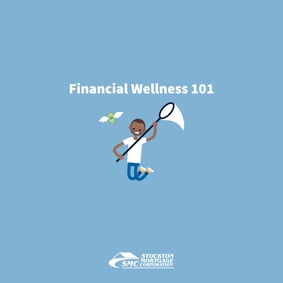 Since we are entertaining this “New Decade, New You” mentality, let’s talk about how we’re going to create healthier financial habits in the next 10 years. I know I’m capable of doing a better job than I did in the last 10 years (I was 17 in 2010 for crying out loud!). I wanted some concrete advice so I did the only thing I could think of – I asked a mortgage banker. Not just any mortgage banker, I asked Cindy Bradley, who is always giving me financial tips! Take notes, you won’t want to forget this information.
Since we are entertaining this “New Decade, New You” mentality, let’s talk about how we’re going to create healthier financial habits in the next 10 years. I know I’m capable of doing a better job than I did in the last 10 years (I was 17 in 2010 for crying out loud!). I wanted some concrete advice so I did the only thing I could think of – I asked a mortgage banker. Not just any mortgage banker, I asked Cindy Bradley, who is always giving me financial tips! Take notes, you won’t want to forget this information.
1. Review your credit report……regularly! (click this link)
Good credit is a powerful tool. It goes hand in hand with a good credit score. Your credit score is a 3 digit number that sums up how reliable you are at paying back debt. Your credit history on your credit report determines your score. If you pay your bills on time every month, your score goes up. If you miss payments or pay late, your score will go down. Financial wellness includes monitoring your credit report for errors or fraud. Every person in America has the ability to check their credit report at “no charge” from each of the three credit bureaus (Equifax, Experian, & Transunion) annually. This should be done at least once per year. You can check all three bureaus at once or check each bureau quarterly. Don’t wait until you are ready to buy a home to check your credit report. Be proactive and do it today! See the link above.
2. Start saving, no matter how small.
In the New Year, pledge to pay yourself first. The quickest way to avoid turning to credit cards for “unexpected” expenses is to start with a goal of saving $1,000 in an emergency fund. From there you can begin building toward 3-6 months of expenses in your fund. So many people say, “I’m going to wait and save after I’ve paid all my bills and I’ll save what’s left,” but we all know what happens then. Very seldom is there anything left. So, the idea of paying yourself first is to prioritize taking good care of your financial future by putting yourself in the front of your bill-paying line. That’s right, sometimes it’s even helpful to think about paying yourself as a bill that you pay, putting a little bit aside each month. It doesn’t even really matter how much it is. What’s most important is creating a habit.
3. Tell your money what to do by Budgeting (click this link here)
Yes, the dreaded “B” word. A budget is just an action plan for your money. Sit down once a month with your spouse or significant other and give every dollar a name. Consider wants vs. needs carefully. Dave Ramsey recommends starting with the most important categories first. Savings, food, shelter, utilities, transportation, and clothing. Dave endorses a free budget tool called EveryDollar. It’s an easy app-based budget for your devices. There is a link above. Once your true necessities are taken care of, you can fill in the rest of your categories based on your goals. If you want to increase your emergency fund, pay off student loan debt, or credit card debt, then a budget helps you set and accomplish goals. One of those goals could be our next topic below.
4. Retirement Planning
Planning for retirement early is a crucial aspect of financial wellness. Whether you’re saving money in an employer-sponsored 401(k) plan or independently in an IRA, it’s a great idea to have some form of retirement savings as soon as you reach your early twenties to take advantage of compound interest and account growth. The more time your money has to grow, the more time it has to benefit from compound interest (which means earning interest on top of interest)! Contribute as much as you can to your company’s 401K, especially if there is a match. Some employers’ 401K plans have a designated Roth account feature, which offers employees the ability to place after-tax wages into the account. As you begin to win the money game, you should free up more funds to dedicate annually to maximize your retirement & investment savings.
Note: This does not constitute Stockton Mortgage Corporation’s endorsement or promotion of any third-party product, organization, or company, nor does it indicate an affiliation with or sponsorship of the third party by Stockton Mortgage Corporation.
Have more questions about this topic? Leave them in the comments below! We are always looking for new blog topics for our readers!
Until next time,
Savanna
